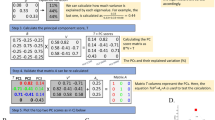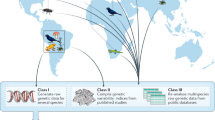Abstract
IN the review of Dr. R. A. Fisher's “Statistical Methods for Research Workers” in NATURE of June 8, the point is made that a careless reader may get the impression that the various methods outlined therein will give exact results when applied to the ordinary small “sample’, although we have, in general, no proof, or even expectation, that the sample is drawn from a ‘normal’ population, to which alone the tables can be exactly applied. That this is so is clear from the fact that an American writer has stated that the English school of statisticians claims to have produced tables which may be used for samples, however small, drawn from any conceivable population; but of course Dr. Fisher would be the first to cry out against the foolishness of making any such claim.
Similar content being viewed by others
Article PDF
Author information
Authors and Affiliations
Rights and permissions
About this article
Cite this article
"STUDENT" Statistics in Biological Research. Nature 124, 93 (1929). https://doi.org/10.1038/124093b0
Issue Date:
DOI: https://doi.org/10.1038/124093b0
Comments
By submitting a comment you agree to abide by our Terms and Community Guidelines. If you find something abusive or that does not comply with our terms or guidelines please flag it as inappropriate.



